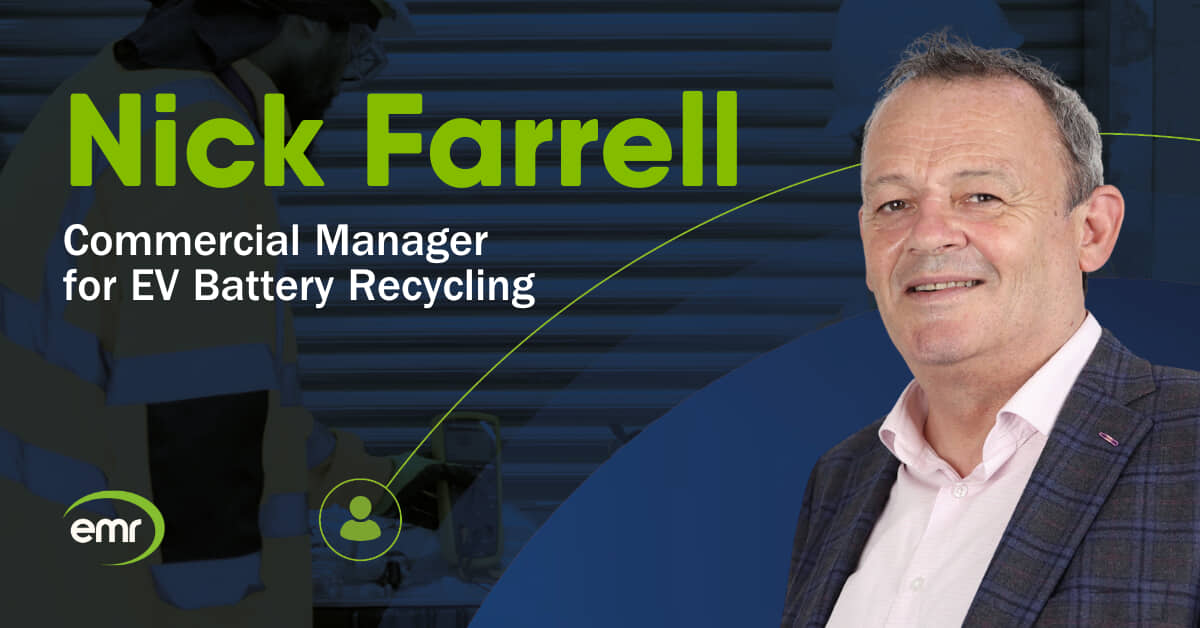CHOOSE
A DIFFERENT TERRITORY

The opening of the brand-new Battery Recycling Centre at EMR Birmingham last year was a clear sign that EMR, a global leader in sustainable materials, is focused on grasping the opportunities that electric vehicles (EVs) will present to the industry.
The arrival of Nick Farrell to the business – joining Helen Waters, Head of EMR EV Battery Recycling team as Commercial Manager for EV Battery Recycling – is the next step in turning this opportunity into the capability to extract as much material as possible from every electric vehicle that reaches end-of-life – on a huge, and growing, scale.
“When I met with the EMR team to discuss the role, one of the things I was so impressed with was how far down the line the company is,” says Nick. “It's not just about servicing what's required today, but about planning ahead for where the industry might go in the future. The investment in the EV side of the business shows that EMR will be able to fulfil the needs of our customers as they start to shift.”
Having worked for firms including Copart, Synetiq and Verisk, Nick has spent a career building up a deep knowledge of the salvage, end of life vehicles and insurance industry – which is vital as EMR looks to build an industrial-scale supply chain for end-of-life EV batteries in the months and years ahead.
“The priority for me in this role is to achieve the volumes of end-of-life EV batteries needed to feed this new facility. That means reaching out to new customers, leveraging existing EMR relationships with car makers and taking advantage of EMR’s trusted secure disposal service, enabling manufacturers to recycle their latest prototype vehicles.”
It will also see Nick go back to the insurance industry and accident management companies to build up those partnerships from a new perspective.
“We’re still at a very early stage in this transition in many ways. Some companies still don’t insure EVs and there are rumours and misplaced anxieties around their range and performance,” says Nick.
This is already beginning to change – with the transition only set to accelerate in the years ahead.
“If you go to any car dealership now, you won't see many internal combustion engine (ICE) vehicles – certainly not in the main showrooms, where they're all EVs or hybrids. EMR is a trusted partner for the whole industry, so the work we’re doing now is just about making sure we have a solution for when these vehicles reach end-of-life.”
One of the elements of EMR’s EV battery recycling operation which has already pleasantly surprised Nick is how each battery can be processed depending on its condition, whether that’s reuse, repair or recycling:
“It’s about delivering the best solution to the customer, rather than the option which suits us. To have a circular economy where we can offer three different routes for these batteries means we're doing the best thing for the customer and the environment.”
And it’s not just the advanced technology that’s caught Nick’s eye. EMR’s battery recycling plant is less than a year old, but Nick is already proud with the processes and ways of working that have been developed:
“It feels like a main dealer workshop in terms of the equipment being used, the cleanliness and how the whole operation works. And I'm very impressed with the measures in place to keep everyone on site safe.”
Nick is aware that he arrives, not only at an important moment for EMR, but during a historic period for the automotive industry, too:
“I’ve been working in this sector for 25 years and there have been changes in legislation, codes of practice and how salvage is dealt with – but what we’re experiencing now is a complete change of how a vehicle is propelled down the road. It’s the biggest change I’ve seen in my career – and for decades before that too.
“Fortunately, from what I’ve seen during my first weeks in this role, it’s a transition that EMR is fully prepared for.”